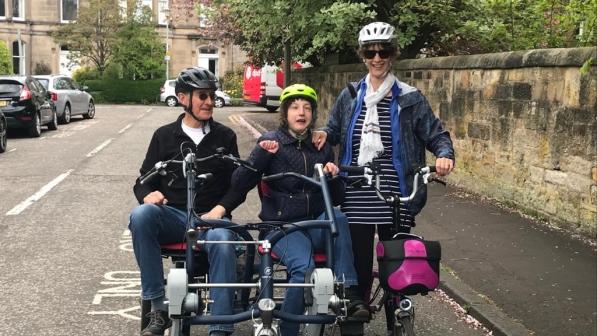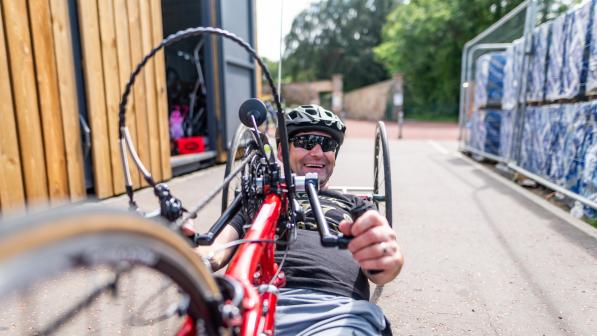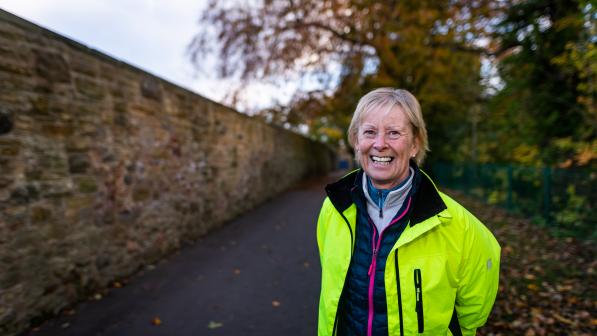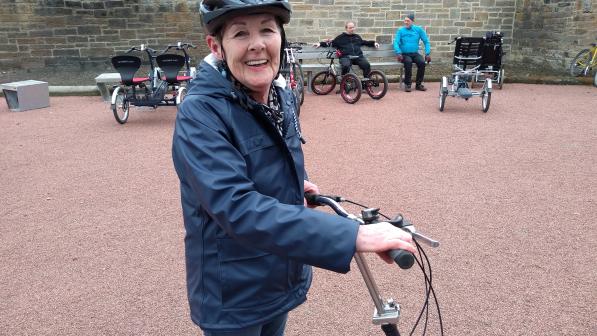Edinburgh ABC: help us continue to change lives through cycling

*** UPDATE Thursday, 01 April ***
Cycling UK has reluctantly had to call a temporary halt to our fundraising for the Edinburgh All-ability Bike Centre mentioned in the below article as we consider the best way to support the project.
As a charity we are fully committed to helping everyone, no matter their age, ability or background, to discover the joys of cycling, and we will look to issue an update of our plans on how we can hopefully continue to run our Edinburgh ABC very soon.
If you have already made a donation to our fundraising appeal, then our team will be in touch shortly to discuss options about your donation.
I’ve seen first-hand how the Edinburgh All-ability Bike Centre (ABC) empowers people to live the active and independent life they want to, as included members of the local community. It’s inspiring to see people’s beliefs about who is able to cycle challenged, as they see a handcycle or trike whizz by. However, due to the impact of coronavirus and pressures on funding, this important work is under threat.
We desperately want to be able to continue to provide the services that we know are vital to our participants, and their friends and families, but unfortunately many sources of funding have dried up since the pandemic struck. We are therefore asking you to consider making a donation so that we can continue to change people’s lives through cycling.
Why do we feel so passionate about this work?
People with disabilities can have significant barriers to physical activity. In a recent Activity Alliance survey just 40% of disabled adults said they feel they are given the opportunity to be as active as they would like, compared with 71% of non-disabled people. This inequality negatively impacts health and wellbeing and prevents disabled people from engaging in community activities that many other people can enjoy.
During the five years that the project has been running, we have been able to support hundreds of people who did not consider cycling to be ‘for them’. Susan Robertson told us that taking up cycling 14 years after being diagnosed with multiple sclerosis, was like “joining the human race again”.

Initially Susan really didn’t think she would be able to do it. “The idea of going out cycling just didn’t seem like something I would be able to do, I did hear ‘all abilities’… but I still thought that my legs probably wouldn’t manage it.”
Once she got going however, the impact was profound. “Absolute, pure bliss. Pure joy. It’s freedom and independence. I just feel as if I’m part of the world again, doing normal things. I’m included.
“Just simple things like walking through a park, which I can’t really do, but I can now cycle through the park, and that to me is like normality. So mentally it’s a very positive thing.”
Many of our participants tell us cycling is hugely beneficial for their mental health. Keen mountain biker Stuart McMillan was paralysed from the chest down in a motorbike crash and thought he’d never cycle again.
It’s good for the mind, it takes you away from the dark places that you can find yourself going into. It’s just brilliant and I’m so glad that I’ve found it
Stuart McMillan, Edinburgh ABC beneficiary
Taking up handcycling with the ABC has been hugely positive for his mental health: “You get into a dark place when you’ve suffered a spinal injury and everything you do is based around cycling and bikes and going fast.
“It’s good for the mind, it takes you away from the dark places that you can find yourself going into. It’s just brilliant and I’m so glad that I’ve found it.”
Our staff and volunteers are crucial to the success of the project; they create a supportive and welcoming environment which is almost as important as the bikes themselves.
Mary Douglas learned to cycle for the very first time with us at the age of 72 and she said our team made all the difference: “[The staff and volunteers are] a really happy crowd. No one needs to ever feel the slightest bit shy, because everybody speaks to you. They’re a super crowd.”

Over the past year, like many other organisations, we have had to change the way that we work. We can’t offer drop-in sessions, and it remains to be seen if and when we will be able to welcome back large groups to the centre.
During lockdown, we’ve lent our bikes to families and key workers, and these have been very gratefully received. One such family are the Wilsons, whose daughter Rachel has additional support needs. Rachel had been happily living in supported accommodation until the coronavirus lockdown meant she had to move back in with her parents in March 2020.
The family borrowed a side-by-side tandem and Rachel’s father Keith told us: “It was difficult for all of us. I don’t think we would have got through the first seven weeks of lockdown without the bike."
At the Edinburgh ABC, we see the huge impact that cycling can have. Rachel’s support worker told us: “Rachel's health and wellbeing is much improved. She enjoys riding the bikes and being able to move a greater distance. She likes being the same as other people and being able to cycle.”

The ABC has principally been funded from grants, trusts, and donations. In the last year, this section of the funding landscape has been under tremendous pressure; many sources of funding have closed, or have changed their profile to offer much-needed coronavirus-response grants.
Those that are still open are in extremely high demand as the whole of the third sector attempts to recover from the pandemic. Unfortunately, this leaves the Edinburgh ABC in a vulnerable position and we really need your help.
It is more important than ever to support disabled people to access active travel options. Glasgow Disability Alliance found that 82% of their members said that isolation during the pandemic was a major concern. Supporting disabled people to get out using active travel is a vital way to support this section of our society at a particularly difficult time.
As one of our participants told us: “Using the side by side on the cycle path attracts attention – it’s an object of wonder and astonishment! People stop to talk to you – which is great – and they tell you about other great places to ride. It’s a huge door opener!”
If you can see the value in the work that we do, and understand the very real benefits that it brings to our participants’ lives, please consider making a donation to the Edinburgh ABC. All donations will be very gratefully received and will make a real difference to our ability to continue to change lives and support some of the most vulnerable members of our society.




